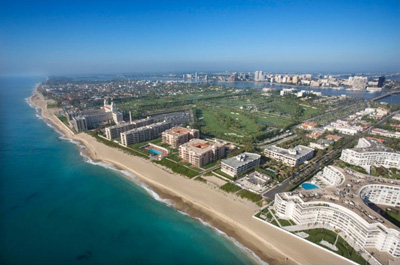 |
| Barack Obama |
(Reuters) - President Barack Obama and Israeli Prime Minister Benjamin Netanyahu are deeply at odds over how fast the clock is ticking toward possible military action against Iran's nuclear program, and their talks on Monday are unlikely to change that.
Even though Obama has offered assurances of stiffened U.S. resolve against Iran before the White House meeting, the two allies are still far apart on explicit nuclear "red lines" that Tehran must not be allowed to cross, and they have yet to agree on a time frame for when military action may be necessary.
Obama wants Israel to hold off on attacking Iran's nuclear sites, insisting there is still time for sanctions and diplomacy to work. But he also vowed in a speech on Sunday to the largest U.S. pro-Israel lobby that he would be ready to act militarily - with all "elements of American power" - to prevent the Islamic republic from building an atomic bomb.
Israeli leaders, who see Iran's nuclear advances as a looming existential threat and reserve the right to act alone in self-defense, have made clear they are operating on a far shorter, more urgent timeline.
Their most immediate concern is that Iran be prevented from reaching nuclear weapons capability, not just from developing an actual device, and they worry that time is running out for an effective Israeli attack as Tehran buries its nuclear facilities deeper underground.
While Obama and Netanyahu - who have had a strained relationship - will share intelligence information on Monday, a source close to the administration said there was little reason to believe they would make significant progress toward bridging key differences on a common threshold for military action.
"They'll be looking for mutual understandings and may find a few, but the biggest problem is they're working on different clocks," the source said.
GEOPOLITICAL DRAMA IN U.S. ELECTION YEAR
Obama's meeting with Netanyahu comes amid U.S. fears that Israel might opt to strike Iran on its own if it is not convinced of Washington's determination to do whatever is needed to rein in Tehran's nuclear ambitions. Iran remains defiant but says it wants nuclear technology strictly for peaceful purposes.
The geopolitical drama is being played out in the midst of a U.S. presidential campaign, with Republican presidential contenders accusing the Democratic president of being too tough on Israel and not tough enough with Iran.
Israel comes to Monday's talks with a firm belief that Iran has decided to seek to develop nuclear weaponry and is gathering the necessary components before attempting a "breakout."
Israeli officials maintain that once Iran moves forward, it could enrich uranium to weapons grade and have a rudimentary nuclear device within months, though constructing a deployable warhead would take longer, perhaps until mid-decade.
U.S. officials do not believe the situation is that close to the brink. They say that while Iran may be maneuvering to keep its options open there is no clear intelligence that the country has made a final decision to pursue a nuclear weapon.
Both sides agree that it is impossible to know the full extent of Iranian intentions. American spy agencies are wary about drawing any categorical conclusions after an embarrassing intelligence lapse that led to erroneous accusations of Iraqi nuclear arms work, which the Bush administration used to help justify the 2003 U.S.-led invasion that toppled Saddam Hussein.
Still, Obama - in an Atlantic magazine interview published on Friday - insisted that Iran "is not yet in a position to obtain a nuclear weapon without us having a pretty long lead time in which we will know that they are making that attempt."
And Obama warned in Washington on Sunday against "loose talk" of war with Iran, saying such "bluster" was counterproductive because it has been driving up global oil prices and boosting demand for Iran's oil exports.
That may have been a message to Netanyahu and other Israeli leaders, whose have engaged in a strident exchange of recriminations with Iranian officials in recent months.
Daniel Levy, an analyst at the New America Foundation think tank, said Obama had "offered clarity and commitments on mainstream Israeli concerns without capitulating to the Netanyahu narrative, which is far more dismissive of diplomacy."
Speaking in Ottawa, the right-wing Israeli leader ignored Obama's appeal to let sanctions run their course and focused on the president's insistence on keeping the military option open and backing Israel's right to defend itself.
It was unclear whether Obama's sharpened rhetoric against Iran and calls for restraint by Israel would be enough to delay any Israeli military plans against Tehran, which has called for the destruction of the Jewish state.
Israeli Defense Minister Ehud Barak has warned that Iran is approaching a "zone of immunity," when Tehran is able to shield its nuclear facilities from Israeli air strikes. The United States, however, would still likely have the firepower for a more sustained air assault to destroy the sites.
BEHIND CLOSED DOORS
Obama took a significant step forward in Israel's eyes when, in the Atlantic interview, he ruled out accepting, then acting to "contain," a nuclear-armed Iran.
While U.S. officials insist that Obama will not publicly lay down any new red lines for Iran during Netanyahu's visit, they do not rule out the possibility that the president might try to mollify some Israeli concerns in private.
"They're going to sit down and they're going to talk through the tactics involved," Obama re-election campaign strategist David Axelrod told the ABC "This Week" television program.
Still, U.S. officials doubt that Netanyahu will provide Obama with any guarantee that Israel will consult Washington - its biggest source of military assistance - before launching any strikes on Iran.
Even if Obama assures Netanyahu that the United States has the firepower to deliver a devastating blow to Iran's nuclear program further down the line, the Israelis have made clear they cannot rely on that commitment alone.
One line of thinking within the Obama administration is that keeping it in the dark about any Israeli military plans might be best for the United States since any sign of complicity would inflame anti-American sentiment in the Muslim world.
Dennis Ross, Obama's former Middle East adviser, suggested, however, that the "noise" from Israel over a possible strike was geared more toward pressuring the international community for tightened sanctions than foreshadowing an imminent attack.
"Now that it's an issue of the world against Iran, Israel likes it that way and would not be inclined to act precipitously," Ross said last week.
But others who know Netanyahu well say he is approaching the Iranian challenge with a sense of historic responsibility to ensure Israel's survival, what some have called the "Holocaust factor."
He has made clear that Israel, believed to be the Middle East's only nuclear weapons power, will do what it takes to prevent Iran from getting the bomb.
Even though Obama has offered assurances of stiffened U.S. resolve against Iran before the White House meeting, the two allies are still far apart on explicit nuclear "red lines" that Tehran must not be allowed to cross, and they have yet to agree on a time frame for when military action may be necessary.
Obama wants Israel to hold off on attacking Iran's nuclear sites, insisting there is still time for sanctions and diplomacy to work. But he also vowed in a speech on Sunday to the largest U.S. pro-Israel lobby that he would be ready to act militarily - with all "elements of American power" - to prevent the Islamic republic from building an atomic bomb.
Israeli leaders, who see Iran's nuclear advances as a looming existential threat and reserve the right to act alone in self-defense, have made clear they are operating on a far shorter, more urgent timeline.
Their most immediate concern is that Iran be prevented from reaching nuclear weapons capability, not just from developing an actual device, and they worry that time is running out for an effective Israeli attack as Tehran buries its nuclear facilities deeper underground.
While Obama and Netanyahu - who have had a strained relationship - will share intelligence information on Monday, a source close to the administration said there was little reason to believe they would make significant progress toward bridging key differences on a common threshold for military action.
"They'll be looking for mutual understandings and may find a few, but the biggest problem is they're working on different clocks," the source said.
GEOPOLITICAL DRAMA IN U.S. ELECTION YEAR
Obama's meeting with Netanyahu comes amid U.S. fears that Israel might opt to strike Iran on its own if it is not convinced of Washington's determination to do whatever is needed to rein in Tehran's nuclear ambitions. Iran remains defiant but says it wants nuclear technology strictly for peaceful purposes.
The geopolitical drama is being played out in the midst of a U.S. presidential campaign, with Republican presidential contenders accusing the Democratic president of being too tough on Israel and not tough enough with Iran.
Israel comes to Monday's talks with a firm belief that Iran has decided to seek to develop nuclear weaponry and is gathering the necessary components before attempting a "breakout."
Israeli officials maintain that once Iran moves forward, it could enrich uranium to weapons grade and have a rudimentary nuclear device within months, though constructing a deployable warhead would take longer, perhaps until mid-decade.
U.S. officials do not believe the situation is that close to the brink. They say that while Iran may be maneuvering to keep its options open there is no clear intelligence that the country has made a final decision to pursue a nuclear weapon.
Both sides agree that it is impossible to know the full extent of Iranian intentions. American spy agencies are wary about drawing any categorical conclusions after an embarrassing intelligence lapse that led to erroneous accusations of Iraqi nuclear arms work, which the Bush administration used to help justify the 2003 U.S.-led invasion that toppled Saddam Hussein.
Still, Obama - in an Atlantic magazine interview published on Friday - insisted that Iran "is not yet in a position to obtain a nuclear weapon without us having a pretty long lead time in which we will know that they are making that attempt."
And Obama warned in Washington on Sunday against "loose talk" of war with Iran, saying such "bluster" was counterproductive because it has been driving up global oil prices and boosting demand for Iran's oil exports.
That may have been a message to Netanyahu and other Israeli leaders, whose have engaged in a strident exchange of recriminations with Iranian officials in recent months.
Daniel Levy, an analyst at the New America Foundation think tank, said Obama had "offered clarity and commitments on mainstream Israeli concerns without capitulating to the Netanyahu narrative, which is far more dismissive of diplomacy."
Speaking in Ottawa, the right-wing Israeli leader ignored Obama's appeal to let sanctions run their course and focused on the president's insistence on keeping the military option open and backing Israel's right to defend itself.
It was unclear whether Obama's sharpened rhetoric against Iran and calls for restraint by Israel would be enough to delay any Israeli military plans against Tehran, which has called for the destruction of the Jewish state.
Israeli Defense Minister Ehud Barak has warned that Iran is approaching a "zone of immunity," when Tehran is able to shield its nuclear facilities from Israeli air strikes. The United States, however, would still likely have the firepower for a more sustained air assault to destroy the sites.
BEHIND CLOSED DOORS
Obama took a significant step forward in Israel's eyes when, in the Atlantic interview, he ruled out accepting, then acting to "contain," a nuclear-armed Iran.
While U.S. officials insist that Obama will not publicly lay down any new red lines for Iran during Netanyahu's visit, they do not rule out the possibility that the president might try to mollify some Israeli concerns in private.
"They're going to sit down and they're going to talk through the tactics involved," Obama re-election campaign strategist David Axelrod told the ABC "This Week" television program.
Still, U.S. officials doubt that Netanyahu will provide Obama with any guarantee that Israel will consult Washington - its biggest source of military assistance - before launching any strikes on Iran.
Even if Obama assures Netanyahu that the United States has the firepower to deliver a devastating blow to Iran's nuclear program further down the line, the Israelis have made clear they cannot rely on that commitment alone.
One line of thinking within the Obama administration is that keeping it in the dark about any Israeli military plans might be best for the United States since any sign of complicity would inflame anti-American sentiment in the Muslim world.
Dennis Ross, Obama's former Middle East adviser, suggested, however, that the "noise" from Israel over a possible strike was geared more toward pressuring the international community for tightened sanctions than foreshadowing an imminent attack.
"Now that it's an issue of the world against Iran, Israel likes it that way and would not be inclined to act precipitously," Ross said last week.
But others who know Netanyahu well say he is approaching the Iranian challenge with a sense of historic responsibility to ensure Israel's survival, what some have called the "Holocaust factor."
He has made clear that Israel, believed to be the Middle East's only nuclear weapons power, will do what it takes to prevent Iran from getting the bomb.
Read current news at http://bbc-cnn-worldnews.blogspot.com





















